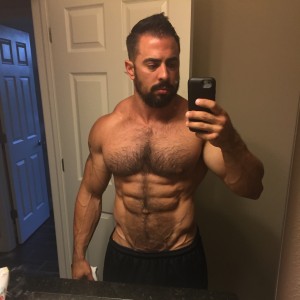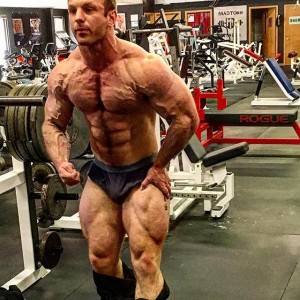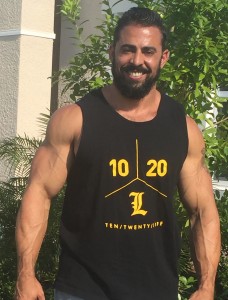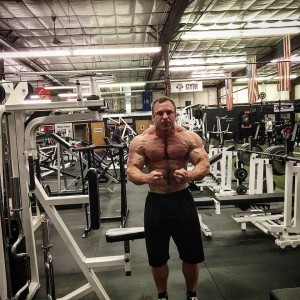
04 Aug Powerlifting Nutrition Part 3: Powerbuilding Edition
By Danny Vega and Tucker Loken
I consider myself a student of the game. I have a voracious appetite for new information and I am always open to trying new things.
As I said in Part 1 HERE and Part 2 HERE
I have tried several diet approaches over the last 20 years. In 2010, I became a crusader for the paleo diet. I still think it is a great diet. Eating whole foods, not consuming excess carbs, and overall caring about what goes into your body is never a bad thing. Besides, the bar is set pretty low for approaches that are better than the standard American (SAD) diet.
[wa-wps]
In 2013, when I started powerlifting, I thought it was cool to eat junk food again and for a few months I looked terrible. I corrected that and began carb cycling and have enjoyed that approach for the past couple of years. I would consume around 45-50% of my calories from carbs on training days and drop the carbs and increase fats on off days. It allowed me to maintain a level of leanness, even as a powerlifter who did little to no cardio. This year, when I decided to let powerlifting take a back seat and focus on powerbuilding, I changed approaches yet again.
For three months, I let my teammate, Tucker Loken, take over my nutrition. I have never been this lean (well, maybe when I did Crossfit, but I was carrying about 15-20 lbs less of muscle). Tucker is a bodybuilder who happens to also be a powerlifter, so there were bound to be some differences in our nutritional approaches. In this article I will outline the basic tenets of how I ate for powerbuilding, as well as give a truthful account of my experience.
To help me transition, Tucker kept me carb cycling for the first couple of months, albeit not as drastic of a swing in carbs and fats as I was used to. The main difference by far, was the elimination of most of the fat in my diet. I would consider the amount of fat I was eating before moderate to low, but we basically cut that in half. Protein was also bumped up. On training days, my fat was under 15% of total calories, with carbs at about 50% and protein at about 35%. Off days, we had fat at about 25% with protein up to 40% and carbs down to 35%. Keep in mind two things: 1) These are ballpark numbers. If you want to really learn and get the full details, hire someone who knows their stuff. Tucker is my obvious recommendation. I even paid him to take over my wife’s nutrition (and I’m no dummy when it comes to nutrition). 2) This was our baseline. A smart coach will pay close attention to how well you respond and adjust weekly if necessary.
The Good
VASCULARITY. Beyond anything you have experienced before. Keeping the carbs high, even on off days, means your muscles will always be full of glycogen. Training is extremely fun, especially if you are training with higher reps powerbuilding style. If you stick to the diet, you will get extremely lean! Also, eating this way is extremely cheap. Rice, oats, grains, chicken, tilapia, vegetables and the other foods you would eat on this diet can be purchased in bulk at places like Costco and it really is easy and highly available. I lost 19 lbs over 3 months and I can’t tell you how many times people came up to me and asked me how much weight I put on.
The Bad
Eating out is extremely difficult when your fat is so low. You either have to cheat and risk slowing your progress, or buy two entrees on the “skinny” menu. You will end up paying twice as much and probably still not be satisfied. The good news is that in my case, we would cheat once a week for the first couple of months. In the last half, I went two weeks without cheating. Secondly, eating foods low in fat gets old. After 3 months of doing this, I binge ate two weekends in a row. Sure, I could have sucked it up but at that point I was really lean and sick of eating that way. This is fine. You can always up the fat and keep calories at maintenance levels for a month or so, then get back on the wagon if you want to get leaner. Late in the diet, I felt hungry a lot of the time. Fat fills and I didn’t have much fat.
There is no question that this form of eating works. The majority of bodybuilders and physique athletes eat this way for a reason. You need carbs to fuel your workouts and keep your muscles looking full. So cutting the fat is really the best thing you can do to maintain a caloric deficit.
What’s next?
I like taking things to the extreme and finding out what my body is capable of. I am currently on day 4 of a ketogenic diet. Right now, all I can say is that I love my life. Fat is delicious. I have also broken through a plateau the last couple of days so let’s see what happens. Look for something on that in the next couple of months.
Notes from the 10/20/Dietcoach Tucker Loken:
I purposely gave Danny a low fat high carb diet for a couple reasons.
First, I wanted to give him something he hadn’t done before. A big thing to remember is that almost any training program and any diet will work for most people, as long as the coach is experienced and knows how to listen to the body. I’ve had keto clients before, one in particular said that her favorite part of the diet was the last month when she only got fats and protein. She said it felt great, she had plenty of energy and kept getting leaner. I’ve also had clients that regardless of how much fat or protein I gave them, their body would almost shut down when carbs got too low. I don’t make a habit of testing people until their body goes haywire, but if you work with enough people you’ll run into a few who’s bodies are very particular to one type of training or diet. These people are rare though, and for most people a moderate approach in either of the styles will work, as long as they are patient and listen to what their body is telling them. I knew the signs I was looking for, and even though it was a big switch up for him, it worked extremely well.
Sign 1 – Muscle fullness while losing body fat. This is big whether you’re doing low carb or low fat. If you’re not just a couple weeks from a bodybuilding show and start experiencing flatness, lack of energy or weakness, you’re headed the wrong way. Danny was changing weekly, the scale was reflecting it and his muscles were always tight and full. This is what we call #winning. When this is the case don’t change anything until your body stops losing fat and you need to lower calories or increase cardio to encourage fat loss.
Sign 2 – No serious cravings. Since we only had 10 weeks I wanted to push him a little bit and see how much he could take, so towards the end he started getting a little hungry. Before that though he was enjoying the diet and not wanting to waver. Weekly cheat meals helped with this, but keeping the body well fueled was the biggest factor.
Sign 3 – Adding muscle mass. He was still able to target his shoulders and arms and bring them up in size during the first 6 weeks of the diet. If you’re losing fat and gaining muscle you’re doing something right.
My second reason I gave him this type of diet is that generally it’s easier for people on restricted calories to deal with. Fats can give you a satiated feeling, but they won’t give you that full belly feeling that lots of rice, oats or potatoes will give you. Danny is playing with his own calories and macros now, but I’m sure he can vouch if he were to go back to the amount of calories we had him on when he was at his lowest, and if they were mostly made up from fat and protein, he would be far from a happy camper. Most Powerbuilders are not looking to hop on stage, so the fat loss program should be something fun and exciting to try out, there’s no reason to suffer through it if you don’t need to. A belly full of carbs and protein will do wonders when you’re getting low on calories to stave off cravings and feeling like overall garbage.
Third is that for most people, the more muscle you have the more carbs you’ll need to keep those muscles full. There’s a reason that the general public loves low carb diets, and why most high level bodybuilders keep plenty of carbs in their diet. Muscle mass. When you need to consume significantly more than an average person, getting thousands of calories from fats and proteins can be tough. Yes the whole eggs and bacon are fun, but eating tons of beef, salmon, nuts and oils gets old after a while, and fats are more difficult for your body to turn into glycogen than carbs. There are outliers like Danny who can function well on both, but generally speaking if you’ve got a significant amount of muscle, you’ll need carbs to support that muscle.
In summary, the best advice I can give people is to not be afraid to try new things and keep an open mind. Whether it’s towards a training or a diet program, the only person that knows your body from the inside out is you, and if you keep an open mind and just listen to what’s going on, you’ll learn all about yourself in a way you never did. I know plenty of people who told me that they were really carb sensitive and would get cranky and weak if they didn’t have enough carbs in their diet. I didn’t disregard their information, but with some of them I kept their protein and fats higher than they had before and lowered their carbs. Presto, no issues. They weren’t carb sensitive, they were just not getting enough calories overall when they went low carb. Danny told me all about how much he loved fats and how well he did with low carbs and high fats, but he kept an open mind and let me take the wheel and learned something new about how adaptable his body is. Now he’s taking over again with a whole new set of tools and experience to use as he continues the experiment and gains a deeper understanding of his body.
Don’t be afraid to buy in and try new things. Even if everything goes wrong, at least you learned something you can use going forward.
Danny Vega
Latest posts by Danny Vega (see all)
- Danny Vega – High Protein recap and training - November 8, 2017
- Danny Vega – Hypertrophy Experiment UPDATE - October 28, 2017
- Danny Vega – Hypertrophy Week 1 – 1020Life Seminar - October 9, 2017









Sorry, the comment form is closed at this time.